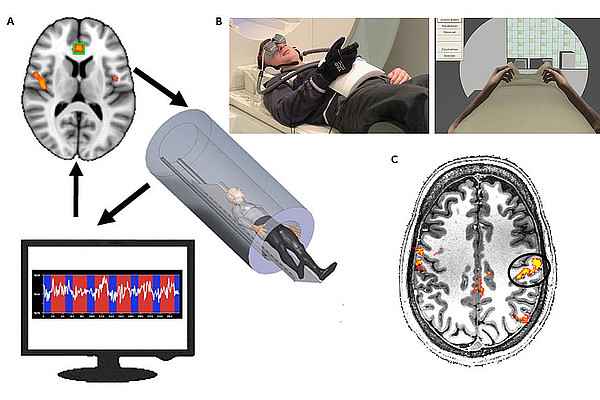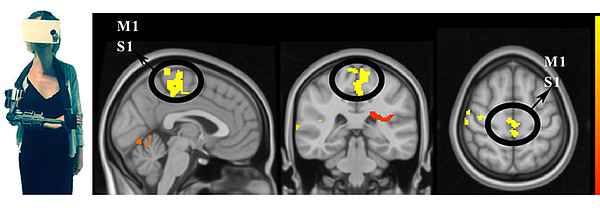Sie befinden sich hier
Inhalt

Learning, Memory and Neural Plasticity - Clinical Applications
Professor for Cognitive and Clinical Neuroscience
Central Institute of Mental Health
Our research focus is the investigation of brain and behavior interactions - especially how behavior and experience influence neuronal processes and how neuronal processes change behavior and experience. A particular focus is on examining the role of learning and memory processes and associated neuroplastic changes in the brain in the development and maintenance of mental disorders such as chronic pain, anxiety disorders and pathological aging. This includes experimental-psychological approaches, neuropsychological tests, peripheral physiological measures as well as structural and functional imaging and stimulation methods. In addition, we develop and investigate novel therapeutic approaches, especially with regard to behavior therapy, also combined with pharmacological intervention. These include extinction training, sensory discrimination training, virtual reality applications, neurofeedback and brain-computer interfaces (Figure 1).

(B): mirror box system based on virtual reality for examinations using functional magnetic resonance imaging: detection of illusion-related brain activations (left: view of the glasses and the data glove, right: virtual environment the subject's / patient's view - presented over the glasses), (C): Brain reactions to heat pain stimuli in a high-field (7 Tesla) magnetic resonance scanner.
We examine chronic pain with a special focus on phantom limb pain and chronic back pain in the CRC 1158 on pain and in the PerPAIN project. In a Reinhard Koselleck project, we develop new brain-based augmented and virtual reality as well as sensorimotor interventions for early indicators of dementia, immobility and frailty as well as chronic pain (Figure 2).

In the DFG-funded CRC/transregio TRR 265 we examine mechanisms of top down and bottom-up interventions for smoking addiction and in the Graduate Research Program 2350 we examine determinants and consequences of violent video gaming. In the IMAC-MIND consortium we develop new screening and prevention instruments for addiction in adolescents.
Noteworthy accomplishments
EU: ERC Advanced Grant “A Mechanism-based Approach to the Prevention of Chronic Pain and its Comorbid Mental Disorders“ (MECHPAIN); Duration: 2024 – 2029
National and international joint research projects
Australian Government, National Health and Medical Research Council (NHMRC): “Improving the lives of people with Phantom Limb Pain - the TITAN trial (graded moTor Imagery for phanTom lImb pAiN)”, Duration: 2022 – 2027
DFG: Research Training Group 2761: “Seamless integration of assistance systems for natural human locomotion (LokoAssist)”, Duration: 2022 – 2026.
EU: Marie Sklodorowska-Curie Innovative Training Networks MSCA-ITN-2020-EJD: European joint doctorates project “HaPpY- Comorbidity of cHronic Pain and mood disorders: breaking the vicious cYcle”, Duration: 2021 – 2025
MWK: Consortium application AI Health Innovation Cluster (Innovation Campus Rhine-Neckar region “Expansion of cooperation and translation”, Duration: 2021 – 2024
DFG: Collaborative Project “The role of pandemic-related and individual variability in longitudinal cohorts across the lifespan: do we need to evolve models of neurosociobehavioral trajectories into substance abuse? (CoviDrug)", Duration: 2021 – 2024.
BMBF: Collaborative Research Network PerPAIN – “Improvement of the treatment of chronic musculoskeletal pain disorders through a personalized therapy approach with cross-disease multilevel diagnostics and mechanism-oriented intervention”, Duration: 2020 – 2023.
DFG: CRC/TRR 265 “Losing and regaining control over drug intake: From trajectories to mechanisms to interventions“, 1nd funding phase, Duration: 2019 – 2023
-
Project C01: "Modification of the imbalance between goal-directed and habitual behavior in human addiction" (together with Professor (apl.) Dr. Sabine Vollstädt-Klein)
DFG: Research Training Group GRK 2350 "Impact of adverse childhood experiences on psychosocial and somatic conditions across the lifespan", Duration: 2018 – 2023.
-
Project A04: "The relationship of ACE and violent video gaming: Effects on pain perception, pain-related empathy and aggression towards self and others" (together with PD Dr. Susanne Becker)
BMBF: Consortium IMAC-Mind “Improving Mental health and reducing Addiction in Childhood and adolescence through Mindfulness: Mechanisms, Prevention and Treatment”, Duration: 2017 – 2023.
-
Subproject 2: Development of addiction-relevant screening and prevention instruments in a mechanism-based approach (together with Prof. Dr. Frauke Nees)
DFG: Reinhart Koselleck project: “Body representation and sensomotor functions modulate brain reorganisation and behavioral changes: from chronic pain to immobility and dementia, Duration: 2016 – 2022
DFG: SFB 1158: “From nociception to chronic pain: Structure-function properties of neural pathways and their reorganization”/1st and 2nd funding period. Duration: 2015 – 2023, deputy spokesperson
- Project B03: "Role of learning, stress and underlying brain circuits involving prefrontal-limbic interactions in the development of chronic back pain" (together with Prof. Dr. Frauke Nees)
-
Project B07: "Neural circuits involved in phantom limb pain" (together with PD Dr. Jamila Andoh)
Hector II Foundation: FRAILBRAIN: “Reversing maladaptive reorganization in frail brains: sensorimotor training, brain plasticity and the role of BDNF", Duration: 2016 – 2018
Legend: DFG = German Research Foundation, BMBF = Federal Ministry of Education and Research, EU = European Union, MWK = Ministry of Science, Research and the Arts, CRC = Collaborative Research Center
Selected publications
- Reduced tactile sensitivity is associated with mild cognitive impairment.
Löffler A, Beier F, Bekrater-Bodmann R, Hausner L, Desch S, Silvoni S, Kleinböhl D, Löffler M, Nees F, Frölich L, Flor H. (2024) EBioMedicine. 99:104896 - Corticostriatal circuits in the transition to chronic back pain: The predictive role of reward learning.
Löffler M, Levine S M, Usai K, Desch S, Kandić M, Nees F, & Flor H. (2022). Cell reports Medicine 3:100677. - When shared pain is not half the pain: enhanced central nervous system processing and verbal reports of pain in the presence of a solicitous spouse.
Nees F, Ditzen B, & Flor H. (2022) Pain 163:e1006-e1012 - Chronic Pain as a Neglected Core Symptom in Mitochondrial Diseases.
Löffler M, Gamroth C, Becker S & Flor H. (2020) Neurology 94(8):357-359. - The evaluation and brain representation of pleasant touch in chronic and subacute back pain.
Nees F, Usai K, Loffler M, Flor H. (2019) Neurobiol Pain 5:100025. - Placebo effects of a sham opioid solution: a rondomized controlled study in patients with chronic low back pain.
Klinger,R, Kothe,R, Schmitz,J, Kamping S, Flor H. (2017) Pain 158:1893-1902. - Structural plasticity and reorganisation in chronic pain.
Kuner R & Flor H. (2017) Nature Reviews Neuroscience 18:20-30. - Neural basis of reward anticipation and its genetic determinants.
Jia T, Macare C, Desrivieres S, Gonzalez DA, Tao C, Ji X, Ruggeri B, Nees F, Banaschewski T, Barker GJ, Bokde AL, Bromberg U, Buchel C, Conrod PJ, Dove R, Frouin V, Gallinat J, Garavan H, Gowland PA, Heinz A, Ittermann B, Lathrop M, Lemaitre H, Martinot JL, Paus T, Pausova Z, Poline JB, Rietschel M, Robbins T, Smolka MN, Muller CP, Feng J, Rothenfluh* A, Flor* H, Schumann* G, Consortium I. (2016) Proc Natl Acad Sci U S A 113:3879-3884. *joint last authors - BRAIN NETWORKS. Correlated gene expression supports synchronous activity in brain networks.
Richiardi J, Altmann A, Milazzo AC, Chang C, Chakravarty MM, Banaschewski T, Barker GJ, Bokde AL, Bromberg U, Buchel C, Conrod P, Fauth-Buhler M, Flor H, Frouin V, Gallinat J, Garavan H, Gowland P, Heinz A, Lemaitre H, Mann KF, Martinot JL, Nees F, Paus T, Pausova Z, Rietschel M, Robbins TW, Smolka MN, Spanagel R, Strohle A, Schumann G, Hawrylycz M, Poline JB, Greicius MD, IMAGEN consortium. (2015) Science 348:1241-1244. - Real time fMRI feedback of the anterior cingulate and posterior insular cortex in the processing of pain.
Rance M, Ruttorf M, Nees F, Schad LR, Flor H. (2014) Hum Brain Mapp 35(12):5784-98.
Photo Credits: #1 Central Institute of Mental Health
Kontextspalte
Contact
Central Institute of Mental Health
J 5
68159 Mannheim
Phone +49 621 1703-6302
herta.flor@zi-mannheim.de
